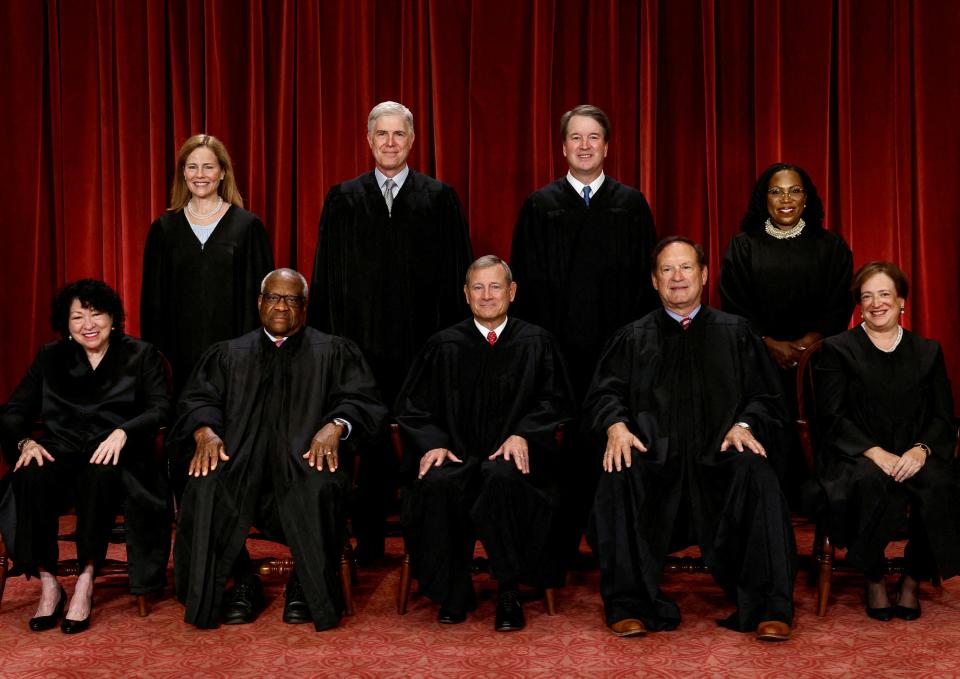Key quotes from Supreme Court's blockbuster - and controversial - Trump immunity ruling
WASHINGTON – One conservative justice wanted to give Donald Trump even more protection from criminal prosecution.
Another wanted to provide the prosecution in the election interference case against Trump a little more leeway.
And the court’s three liberal justices were so incensed by the majority’s opinion that they ended their dissents without the usual preface of “respectfully.”
More: In historic ruling on presidential immunity, Supreme Court says Trump can be tried for private acts
The Supreme Court’s blockbuster decision on Monday granting presidents immunity from criminal prosecution for some of their official actions and a presumption of immunity for others will be pored over by legal scholars, historians and others.
“This case poses a question of lasting significance,” Chief Justice John Roberts wrote for the 6-3 majority.
Here are key quotes from the justices’ opinions.
Roberts: Presidents are `Entitled to at least presumptive immunity'
Roberts said presidents must have at least a presumption of immunity for their official acts.
“The President is not above the law,” he wrote. “But under our system of separated powers, the President may not be prosecuted for exercising his core constitutional powers, and he is entitled to at least presumptive immunity from prosecution for his official acts. That immunity applies equally to all occupants of the Oval Office.”
Otherwise, Roberts wrote: "A president inclined to take one course of action based on the public interest may instead opt for another, apprehensive that criminal penalties may befall him upon his departure from office.”
More: Trump aide Steve Bannon reports to federal prison for defying House Jan. 6 subpoena
The only actions that can clearly be prosecuted are those taken outside of a president’s official duties, the high court said.
The majority left it to the lower courts to decide how that applies to the charges Trump faces for trying to overturn the 2020 election − though they set a high bar.

Thomas: The entire prosecution may be unconstitutional
Justice Clarence Thomas signed onto the majority opinion but wrote separately to raise “another way in which this prosecution may violate our constitutional structure.”
Thomas said it’s unclear if Attorney General Merrick Garland had the authority to appoint Jack Smith as special counsel.
“If there is no law establishing the office that the Special Counsel occupies, then he cannot proceed with this prosecution,” Thomas wrote. “A private citizen cannot criminally prosecute anyone, let alone a former President."
More: Supreme Court presidential immunity ruling shakes up the Biden-Trump conversation
Barrett wanted to allow official acts to be introduced as evidence
Justice Amy Coney Barrett signed onto most of the majority ruling but would allow Trump’s official actions to be entered as evidence in a trial, even if they can’t be a basis for any of the charges.
Her conservative colleagues said that “would permit a prosecutor to do indirectly what he cannot do directly.”
But Barrett sides with the court’s three liberals on this point.
“The Constitution does not require blinding juries to the circumstances surrounding conduct for which Presidents can be held liable,” she wrote.
Sotomayor: Trump got `all the immunity he asked for'
In a dissent joined by her two liberal colleagues, Justice Sonia Sotomayor said the decision “makes a mockery of the principle, foundational to our Constitution and system of Government, that no man is above the law.”
She said the majority relied on “little more than its own misguided wisdom about the need for `bold and unhesitating action’” by a president, giving Trump “all the immunity he asked for and more.”
The ruling, she wrote, would allow a president to order SEAL Team 6 to assassinate a political rival, organize a military coup to hold onto power or accept a bribe in exchange for a pardon.
“With fear for our democracy,” Sotomayor wrote, “I dissent.”
Jackson fears the majority is wrong; hopes they are right
While Justice Ketanji Brown Jackson “agreed with every word" of Sotomayor’s powerful dissent, she wrote a separate opinion to add her own admonishment.
She said the nation has "lost a substantial check on presidents who would use their official powers to commit crimes with impunity while in office."
“The majority of my colleagues seems to have put their trust in our Court’s ability to prevent Presidents from becoming Kings through case-by-case application of the indeterminate standards of their new Presidential accountability paradigm,” she wrote. “I fear that they are wrong. But, for all our sakes, I hope that they are right.”
This article originally appeared on USA TODAY: Supreme Court Trump immunity decision: Key quotes from ruling


